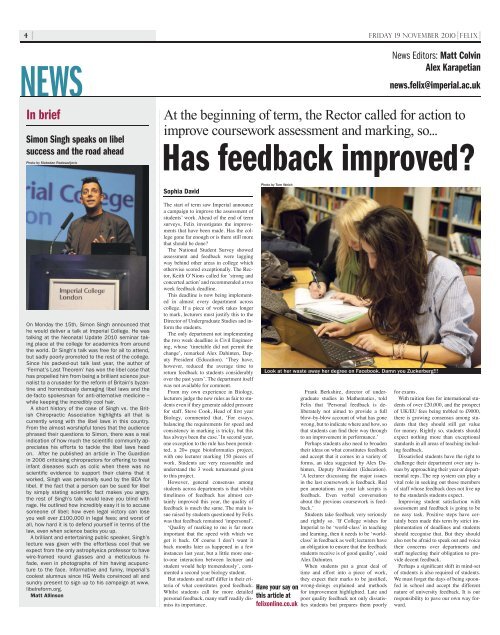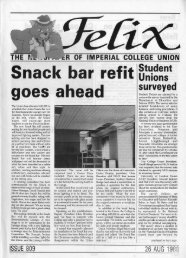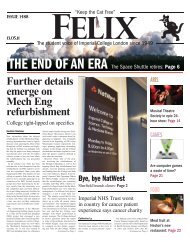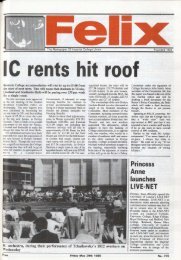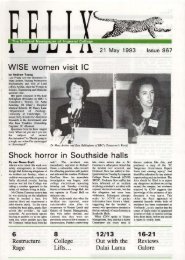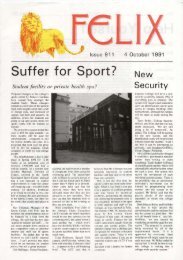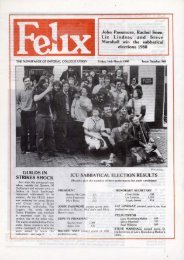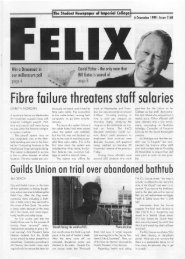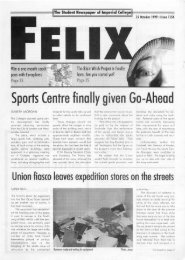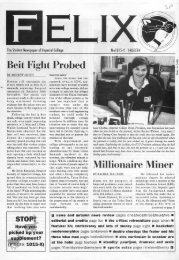1 - 9 News.indd - Felix
1 - 9 News.indd - Felix
1 - 9 News.indd - Felix
Create successful ePaper yourself
Turn your PDF publications into a flip-book with our unique Google optimized e-Paper software.
4<br />
NEWS<br />
In brief<br />
Simon Singh speaks on libel<br />
success and the road ahead<br />
Photo by Slobodan Radosavljevic<br />
On Monday the 15th, Simon Singh announced that<br />
he would deliver a talk at Imperial College. He was<br />
talking at the Neonatal Update 2010 seminar taking<br />
place at the college for academics from around<br />
the world. Dr Singh’s talk was free for all to attend,<br />
but sadly poorly promoted to the rest of the college.<br />
Since his packed-out talk last year, the author of<br />
‘Fermat’s Last Theorem’ has won the libel case that<br />
has propelled him from being a brilliant science journalist<br />
to a crusader for the reform of Britain’s byzantine<br />
and horrendously damaging libel laws and the<br />
de-facto spokesman for anti-alternative medicine –<br />
while keeping the incredibly cool hair.<br />
A short history of the case of Singh vs. the British<br />
Chiropractic Association highlights all that is<br />
currently wrong with the libel laws in this country.<br />
From the almost worshipful tones that the audience<br />
phrased their questions to Simon, there was a real<br />
indication of how much the scientifi c community appreciates<br />
his efforts to tackle the libel laws head<br />
on. After he published an article in The Guardian<br />
in 2006 criticising chiropractors for offering to treat<br />
infant diseases such as colic when there was no<br />
scientifi c evidence to support their claims that it<br />
worked, Singh was personally sued by the BCA for<br />
libel. If the fact that a person can be sued for libel<br />
by simply stating scientifi c fact makes you angry,<br />
the rest of Singh’s talk would leave you blind with<br />
rage. He outlined how incredibly easy it is to accuse<br />
someone of libel; how even legal victory can lose<br />
you well over £100,000 in legal fees; and worst of<br />
all, how hard it is to defend yourself in terms of the<br />
law, even when science backs you up.<br />
A brilliant and entertaining public speaker, Singh’s<br />
lecture was given with the effortless cool that we<br />
expect from the only astrophysics professor to have<br />
wire-framed round glasses and a meticulous hifade,<br />
even in photographs of him having acupuncture<br />
to the face. Informative and funny, Imperial’s<br />
coolest alumnus since HG Wells convinced all and<br />
sundry present to sign up to his campaign at www.<br />
libelreform.org.<br />
Matt Allinson<br />
Friday 19 NOVEMBER 2010<br />
FELIX<br />
<strong>News</strong> Editors: Matt Colvin<br />
Alex Karapetian<br />
news.felix@imperial.ac.uk<br />
At the beginning of term, the Rector called for action to<br />
improve coursework assessment and marking, so...<br />
Has feedback improved?<br />
Sophia David<br />
The start of term saw Imperial announce<br />
a campaign to improve the assessment of<br />
students’ work. Ahead of the end of term<br />
surveys, <strong>Felix</strong> investigates the improvements<br />
that have been made. Has the college<br />
gone far enough or is there still more<br />
that should be done?<br />
The National Student Survey showed<br />
assessment and feedback were lagging<br />
way behind other areas in college which<br />
otherwise scored exceptionally. The Rector,<br />
Keith O’Nions called for ‘strong and<br />
concerted action’ and recommended a two<br />
week feedback deadline.<br />
This deadline is now being implemented<br />
in almost every department across<br />
college. If a piece of work takes longer<br />
to mark, lecturers must justify this to the<br />
Director of Undergraduate Studies and inform<br />
the students.<br />
The only department not implementing<br />
the two week deadline is Civil Engineering,<br />
whose ‘timetable did not permit the<br />
change’, remarked Alex Dahinten, Deputy<br />
President (Education). ‘They have,<br />
however, reduced the average time to<br />
return feedback to students considerably<br />
over the past years’. The department itself<br />
was not available for comment.<br />
From my own experience in Biology,<br />
lecturers judge the new rules as fair to students<br />
even if they generate added pressure<br />
for staff. Steve Cook, Head of fi rst year<br />
Biology, commented that, ‘For essays,<br />
balancing the requirements for speed and<br />
consistency in marking is tricky, but this<br />
has always been the case.’ In second year,<br />
one exception to the rule has been permitted,<br />
a 20+ page bioinformatics project,<br />
with one lecturer marking 150 pieces of<br />
work. Students are very reasonable and<br />
understand the 3 week turnaround given<br />
to this project.<br />
However, general consensus among<br />
students across departments is that whilst<br />
timeliness of feedback has almost certainly<br />
improved this year, the quality of<br />
feedback is much the same. The main issue<br />
raised by students questioned by <strong>Felix</strong><br />
was that feedback remained ‘impersonal’.<br />
‘Quality of marking to me is far more<br />
important that the speed with which we<br />
get it back. Of course I don’t want it<br />
back months later as happened in a few<br />
instances last year, but a little more oneto-one<br />
interaction between lecturer and<br />
student would help tremendously’, commented<br />
a second year biology student.<br />
But students and staff differ in their criteria<br />
of what constitutes good feedback.<br />
Whilst students call for more detailed<br />
personal feedback, many staff readily dismiss<br />
its importance.<br />
Photo by Tom Welch<br />
Look at her waste away her degree on Facebook. Damn you Zuckerberg!!!<br />
Have your say on<br />
this article at<br />
felixonline.co.uk<br />
Frank Berkshire, director of undergraduate<br />
studies in Mathematics, told<br />
<strong>Felix</strong> that ‘Personal feedback is deliberately<br />
not aimed to provide a full<br />
blow-by-blow account of what has gone<br />
wrong, but to indicate where and how, so<br />
that students can fi nd their way through<br />
to an improvement in performance.’<br />
Perhaps students also need to broaden<br />
their ideas on what constitutes feedback<br />
and accept that it comes in a variety of<br />
forms, an idea suggested by Alex Dahinten,<br />
Deputy President (Education).<br />
‘A lecturer discussing the major issues<br />
in the last coursework is feedback. Red<br />
pen annotations on your lab scripts is<br />
feedback. Even verbal conversation<br />
about the previous coursework is feedback.’<br />
Students take feedback very seriously<br />
and rightly so. ‘If College wishes for<br />
Imperial to be ‘world-class’ in teaching<br />
and learning, then it needs to be ‘world-<br />
class’ in feedback as well; lecturers have<br />
an obligation to ensure that the feedback<br />
students receive is of good quality’, said<br />
Alex Dahinten.<br />
When students put a great deal of<br />
time and effort into a piece of work,<br />
they expect their marks to be justifi ed,<br />
wrong-doings explained and methods<br />
for improvement highlighted. Late and<br />
poor quality feedback not only dissatisfi<br />
es students but prepares them poorly<br />
for exams.<br />
With tuition fees for international students<br />
of over £20,000, and the prospect<br />
of UK/EU fees being trebled to £9000,<br />
there is growing consensus among students<br />
that they should still get value<br />
for money. Rightly so, students should<br />
expect nothing more than exceptional<br />
standards in all areas of teaching including<br />
feedback.<br />
Dissatisfi ed students have the right to<br />
challenge their department over any issues<br />
by approaching their year or departmental<br />
reps. The rep system can play a<br />
vital role in seeking out those members<br />
of staff whose feedback does not live up<br />
to the standards students expect.<br />
Improving student satisfaction with<br />
assessment and feedback is going to be<br />
no easy task. Positive steps have certainly<br />
been made this term by strict implementation<br />
of deadlines and students<br />
should recognise that. But they should<br />
also not be afraid to speak out and voice<br />
their concerns over departments and<br />
staff neglecting their obligation to provide<br />
decent feedback.<br />
Perhaps a signifi cant shift in mind-set<br />
of students is also required of students.<br />
We must forget the days of being spoonfed<br />
in school and accept the different<br />
nature of university feedback. It is our<br />
responsibility to pave our own way forward.


